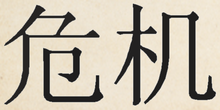- Chinese word for "crisis"
-
The Chinese word for "crisis" (simplified Chinese: 危机; traditional Chinese: 危機; pinyin: wēijī; Wade–Giles: wei-chi) is frequently invoked in motivational speaking along with the statement that the two characters it is composed of represent "danger" and "opportunity." Some Western linguists consider this analysis fallacious, arguing that the character jī alone does not necessarily mean "opportunity."
Contents
Analysis of wēijī
Chinese philologist Victor H. Mair of the University of Pennsylvania calls the popular interpretation of wēijī in the English-speaking world a "widespread public misperception."[1] Mair argues that while wēi (危) does roughly mean "danger, dangerous; endanger, jeopardize; perilous; precipitous, precarious; high; fear, afraid" (as in wēixiăn 危险, "dangerous"), the polysemous jī (机) does not necessarily mean "opportunity." The compound noun jīhuì (机会) means "opportunity," but jī is only a part of it; jī has numerous meanings, including "machine, mechanical; airplane; suitable occasion; crucial point; pivot; incipient moment; opportune, opportunity; chance; key link; secret; cunning." More importantly, these are "secondary" meanings—according to Mair, jī only acquires the connotations of secondary meanings (such as "opportunity") when used in conjunction with another morpheme (in this case, in jīhuì); by itself, it does not have these meanings. Mair suggests that jī in wēijī is closer to "crucial point" than to "opportunity."[1]
Origins
Benjamin Zimmer has traced the history of weiji in English as far back as anonymous editorial in a journal[2] for missionaries in China.[3] The use of the term probably gained momentum when John F. Kennedy delivered a speech in Indianapolis on April 12, 1959:[3]
- When written in Chinese the word crisis is composed of two characters.
- One represents danger, and the other represents opportunity.[4]
Kennedy employed this trope routinely in his speeches, and it was then appropriated by Richard M. Nixon and others. The usage has been adopted by business consultants and motivational speakers and has gained great popularity in universities and in the popular press. For example, in 2007, Condoleezza Rice used the meme during Middle East peace talks,[5] and Al Gore did so both in testimony before the U.S. House of Representatives Energy and Commerce Committee,[6] and in his Nobel Peace Prize acceptance lecture.[7]
Citing Mair, who has suggested that its popularity is due in part to "wishful thinking"[1], linguist Benjamin Zimmer attributes the appeal of this anecdote to its "handiness" as a rhetorical device and an optimistic "call to action."[8]
Use in popular culture
In the Simpsons episode "Fear Of Flying" (Episode 2F08, 12/18/94), Lisa Simpson tries to encourage Homer by saying that the Chinese use the same word for crisis and opportunity. Homer then says, "Ah, yes, crisitunity!"[9][10]
References
- ^ a b c Mair, Victor H. (2005). "danger + opportunity ≠ crisis: How a misunderstanding about Chinese characters has led many astray". PinyinInfo.com. http://pinyin.info/chinese/crisis.html. Retrieved 15 January 2009.
- ^ Chinese Recorder (January 1938, "The Challenge of Unusual Times")
- ^ a b Zimmer, Benjamin (27 March 2007). "Crisis = danger + opportunity: The plot thickens". Language Log. http://itre.cis.upenn.edu/~myl/languagelog/archives/004343.html. Retrieved 19 January 2009.
- ^ Remarks by President Kennedy at the Convocation of the United Negro College Fund
- ^ Kessler, Glenn (2007-01-19). "Rice Highlights Opportunities After Setbacks On Mideast Trip". The Washington Post: p. A14. http://www.washingtonpost.com/wp-dyn/content/article/2007/01/18/AR2007011801881.html. Retrieved 2007-12-12.
- ^ Testimony of Honorable Al Gore
- ^ Gore, Al (2007-12-10). "Al Gore: The Nobel Peace Prize 2007: Nobel Lecture". Oslo: Nobel Foundation. http://nobelprize.org/nobel_prizes/peace/laureates/2007/gore-lecture_en.html. Retrieved 2007-12-12.
- ^ Zimmer, Benjamin (22 March 2007). "Stop Him Before He Tropes Again". Language Log. http://itre.cis.upenn.edu/~myl/languagelog/archives/004330.html. Retrieved 19 January 2009.
- ^ The Simpsons Archive
- ^ The Onion A/V Club Simpsons Quotes for Everyday Use
Categories:- Chinese words and phrases
- Environmental sayings
- Proverbs commonly attributed to be Chinese
Wikimedia Foundation. 2010.

